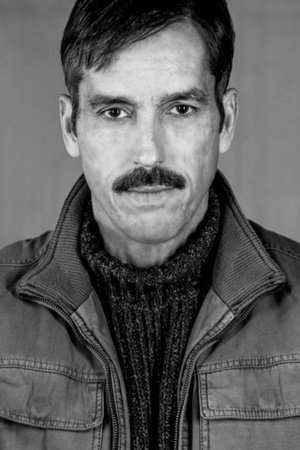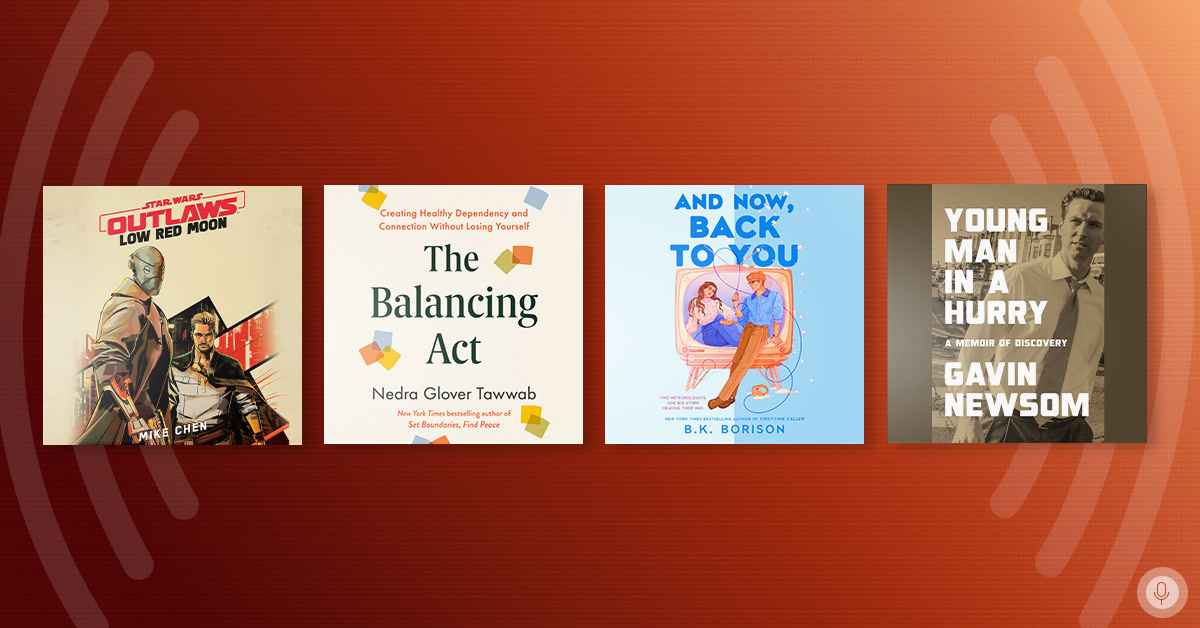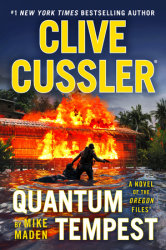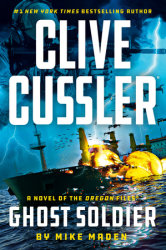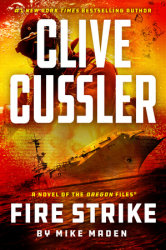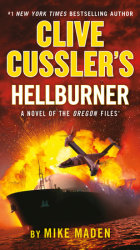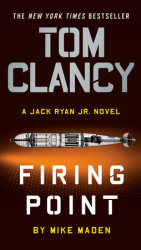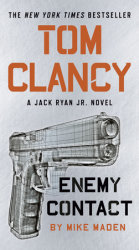Mike Maden is the author of the critically acclaimed Drone series, has lectured and consulted on the topics of war and the Middle East, and served as a campaign manager in state and national elections.
Most recently, he authored a Tom Clancy novel, Point of Contact. We got a chance to speak with Mike about what it was like to carry on the legacy of Tom Clancy by continuing the bestselling Jack Ryan Jr. series, and what his strategies were in writing the novel. Mike also discussed the new topics of interest that are present in his novel, and his exciting future with the series.
PENGUIN RANDOM HOUSE: Since Tom Clancy’s death in October 2013, there have been six novels in the Jack Ryan and Jack Ryan Jr. series written by his former co-authors and collaborators, Mark Greaney and Grant Blackwood. Now, they pass the torch onto you. How has your experience been stepping into the enormous shoes left behind by Tom Clancy and taking up the mantle from Mark and Grant?
MIKE MADEN: The day I got the call from Tom Colgan, the series editor, telling me I got the gig was one of the greatest days in my writing life because I’d been a fan of Tom Clancy since I read The Hunt for Red October in grad school, one of my all time favorite novels. But thirty seconds after the phone call ended, it suddenly became one of the most terrifying days as well. You can’t read in the techno-thriller genre without encountering Tom Clancy because he invented the genre, and the idea that I was now part of the Clancy “canon” along with Mark and Grant was genuinely thrilling, but also deeply humbling. It was a little like being asked to add another few lines to the St. Crispin’s Day speech in Henry V. What could possibly go wrong?
It didn’t help that I’d read Mark and Grant before as well, because those guys can shoot the lights out when they put pen to paper. So not only did I have to reach for that very, very high bar that the three of them had set for me as a writer, but I also had an enormous responsibility to the readers and fans of the series to deliver the goods. That’s a responsibility I take very seriously because I’m a reader and fan myself. One of life’s true pleasures is reading a great novel but few things are more disappointing than a story that fails to live up to its possibility. If my readers are going to lay down their hard-earned cash on the barrel-head to read my work, I’m going to do my very best to earn my wage. I owe them at least that. But I also want to live up to the supreme honor of being invited into The Campus. “To whom much is given” is one of my life’s credos.
PRH:With a Ph.D. in international relations you’re somewhat of an expert on the topics of politics, war and technology. What parts of your background and education helped you the most as you wrote Point of Contact?
MM: My first line of attack when I develop a new story idea is to research it hard—a habit I refined when I was in graduate school where my addictions to history, politics and war were deepened. So in a funny way all of that non-fiction work was the best possible preparation for my fiction writing career, especially in military techno-thrillers. Unfortunately, human history is the history of conflict, and as it turns out, the basis of storytelling is also conflict—because stories ultimately are about us.
PRH:Tom Clancy was known for his uncanny ability to foresee where international trouble was likely to flare up next, most recently predicting Chinese cyber warfare and Russia’s invasion of Ukraine. In Tom Clancy Point of Contact, there’s a subplot that revolves around North Korean missile tests—which as we know actually took place in April. What signs pointed you toward a prediction like this? Do you expect tensions between North Korea and the international community to deescalate?
MM: The United States today remains the world’s ultimate military power, and there are few nations or non-state actors that can even begin to attempt to challenge that power, and the few that do have taken decades to acquire the resources to challenge us. North Korea is one of those challengers and that’s why it will keep popping up in the news as well as in thriller novels like Point of Contact. Kim Jong-un has no hope of confronting us in a conventional land war beyond the Korean peninsula, so the only way he can meaningfully strike at our homeland is through technology like missiles, and SLBMs (sub-launched ballistic missiles) are the natural progression. MIRVing them is the next inevitable step and no doubt they’ll acquire that technology, too, by either buying or stealing it. If I were to write a sequel I’d focus on his satellite technology and North Korea’s potential ability to explode an EMP device over Kansas via their orbiting platforms. That kind of strike would cripple our electric grid and disrupt our entire economy—winning the war before it even began.
PRH: Point of Contact is set in Singapore and focuses on a threat of cyber warfare, which continues to be a major news headline, in particular as countries like the United States, China, and Russia continue to put billions of dollars into developing sophisticated cyber warfare programs. We’ve already seen the effects of cyberattacks in the 2016 U.S. presidential elections. What kind of larger scale cyberattacks could you envision as a threat to national security? How can governments and militaries defend against cyber technology breaches and what are some challenges of cyber defense? Do you anticipate international laws of war expanding to apply to cyber warfare?
MM: Cyber warfare is the new “battle space” because modern economies and militaries are now based entirely on digital platforms. The danger of cyber warfare is that it is virtually costless—essentially, all you need is the brain power of software hackers with access to the Internet—to disrupt or even destroy cyber systems. The great danger now is that quantum computing, which is exponentially more powerful than conventional computing thanks to the superpositional qualities of the “qubit,” threatens to dismantle or even destroy our most robust cyber defenses. But history teaches us that every new offensive technology gives rise to new defenses, and that’s why Point of Contact explores the new arms race: finding a way to create unhackable systems via quantum computers and quantum cryptography.
PRH:This novel features one of Clancy’s most popular characters, Jack Ryan, Jr., the covert intelligence operative son of President Jack Ryan. What makes the Ryans so appealing? How does the father-son dynamic between the Ryans develop in this novel?
MM: I’m the first one in line to agree that Tom Clancy’s genius was to bring current technology into stories in a powerful and entertaining way, but sometimes we forget that the reason why we read novels is to read about ourselves and especially about who we want to be, and Tom Clancy created one of the most compelling and appealing characters in all thriller literature in the person of Jack Ryan, Sr.
“Senior” is brilliant, moral, brave and unapologetically patriotic—exactly the kind of person we all want to be our president (or boss or neighbor or friend) regardless of our political inclinations. It’s not surprising that Senior is also a great dad, and he’s passed along the best of his character traits to his son, “Junior.” We never really got to know Senior as a young man or to watch his moral and physical development, but Junior allows me as both a reader and a writer to explore that progression in his son.
There’s no doubt in my mind whatsoever that Junior is Senior’s number one fan, but he’s still his own person, and even as he’s trying to live up to the high standards of conduct and accomplishment his father set by his life example, Jack Jr. knows he must find his own way in the world. The reason why I wanted Jack to operate independently of The Campus in the current novel was, in part, because The Campus is his father’s creation and it was a chance for Junior to discover for himself how fiercely resourceful he could be when called upon to do so.
PRH:What new information, surveillance, and military technology do we learn about?
MM: Point of Contact is technologically schizophrenic. On the one hand, I really wanted Jack Jr. to have to rely on good old-fashioned analog “smash mouth” trade craft, but on the other hand, I wanted to expose my readers to the next wave of technologies that are disrupting everything we know about economics and warfare. Quantum computing (which will drive the development and deployment of Artificial Intelligence) and virtual/augmented reality are two such disruptive technologies. More important, the corporations that develop these technologies will become increasingly powerful and influential in both civilian and military affairs. (Believe it or not, the greatest corporations in the 21st century will be run by robots, not humans.)
I’m surprised that more so-called “experts” aren’t ringing the gong when it comes to drones (robotics) and the related automation technologies. Humans are almost always the weak link in any performance system, from spot welding to piloting spacecraft. In the coming years, anything that can be automated will be automated, including warfare. According to a 2013 Oxford study (among many others) almost half of ALL American jobs will be automated within the next two decades, and I’m confident that the future of warfare will be dominated by quantum-powered AI-generals and AI-admirals waging land, sea and air drone campaigns. (Yeah, I know. It sounds like science fiction, and it is, except for the fiction part.
No doubt, a two-fisted, red-blooded Jack Ryan, Jr.—or his kids—will be right in the middle of all of that digital mayhem, if I have any say in the matter.
PRH:The Campus is a completely below-the-radar, unofficial intelligence operation sanctioned by the U.S. government but known only to a handful of top government officials. Do you believe such operations actually exist? Would we really know whether they did or not?
MM: The reason why Tom Clancy continues to amaze me is that he took an unflinching look at reality and had the guts to call it as he saw it. One of the themes I explored in my own series is directly connected to the issue raised by The Campus: In a world where the U.S. government is increasingly incapable of doing anything, who can be trusted to secure the safety of the American people? Tom Clancy’s answer was The Campus, founded by the most trustworthy character in American politics, President Jack Ryan, Sr. In real life, it’s becoming terribly difficult to trust those we’ve elected to national office (regardless of party) and so it’s troubling to think that any of them would run an off-the-books organization like The Campus. But given the current state of affairs in the world—and our increasingly disorganized, unfocused and ineffectual response to it—my hope and prayer is that trustworthy patriots (whether in the public eye or not) are still able to answer the call and thwart our enemies before they can strike.
PRH: The line between corporate and national security intelligence operations is often blurry, and The Campus is a prime example of that. What are the upsides and downsides of this kind of collaboration? Are they becoming increasingly intertwined in today’s world?
MM: For some time now, the national security establishment has relied upon private sector contractors to carry out its primary functions. (For years, the NSA contracted out the majority of its functions, e.g. Edward Snowden.) Part of the reason for this was cost savings, but in other cases it was in order to avoid the federal legal complications that private contractors weren’t subject to. But if it’s not legal for a government bureaucrat to do X, why is it legal for that bureaucrat to hire a corporation to carry X out? This is where the problem lies—it’s a legal distinction without a difference. If it’s wrong for a government agency to do it, it should be wrong for the government to hire it out—otherwise, change the law. The idea of The Campus works because we trust Jack Ryan Sr. (and all of The Campus operators) but in reality, private individuals and corporations are motivated by many things other than duty, honor and country. Once again we’re faced with the question: whom do we trust to defend the American people?
Of course, the national security establishment has always relied on private corporations for its operations. The Pentagon isn’t a factory. Our defense industry is second to none, and many of the most important technological achievements have come from entrepreneurs, not bureaucrats. (Example: Google “Abraham Karem.”) Most cutting edge technologies are found in the civilian sector and governments are forced to collaborate with them to achieve their objectives. In fact, governments are finding ways to avoid the difficulties of declarations of war and prohibitions against assassinations by deploying technologies like drone warfare to neutralize enemy combatants. But do we always trust our governments to accurately and reliably identify those enemies? These questions are at the heart of techno-thrillers which is why I love writing in the genre.
PRH:You’re also the author of your own critically acclaimed Troy Pearce series of technothrillers (Drone, etc.). How does writing a Clancy novel differ from writing that series?
MM: Every techno-thriller written today is the offspring of Tom Clancy’s brilliance; in one sense, we’re all writing Tom Clancy novels. The most important difference for me writing in the Tom Clancy series is that I have the privilege of hanging out with some of my favorite characters in the entire genre. The good news for me is that those characters have already been developed and have a history. The creative challenge is to honor and respect that history and those character constructs while imagining them in new environments making unexpected choices. I hope I’ve succeeded.
PRH:Can we expect any more Jack Ryan, Jr. novels from you?
MM: They say lighting doesn’t strike twice but I’m living proof that luck is better than talent. I’m happy to announce that I’ve been asked to write the next Jack Jr., novel, Line of Sight, due out in June 2018.
